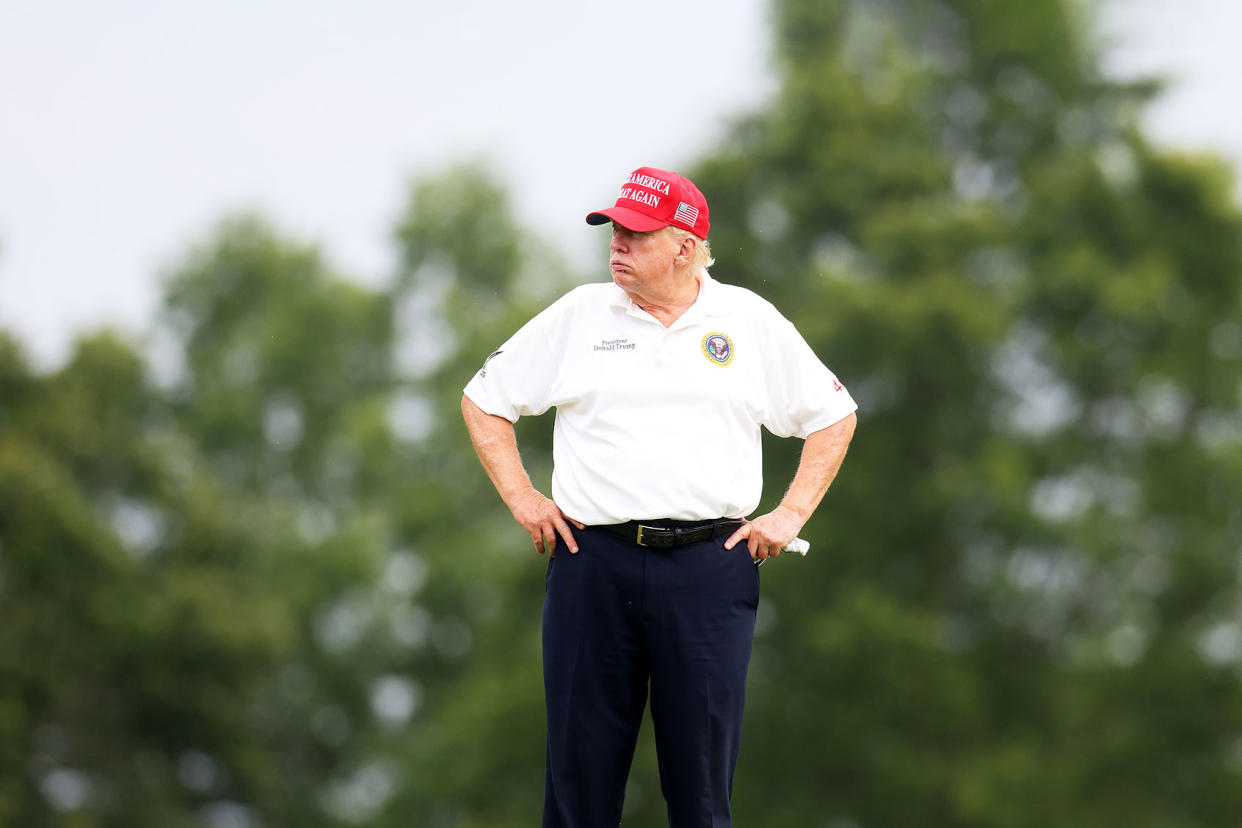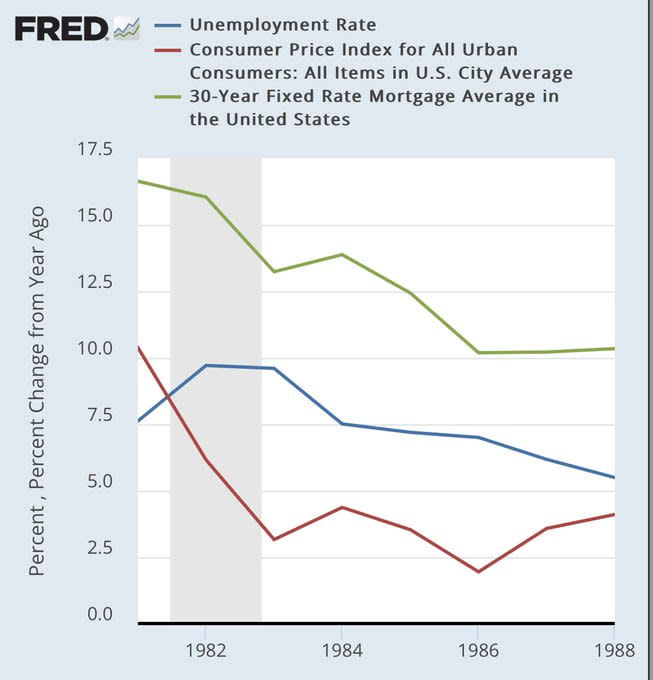The zombie Trump effect

I am loath to discuss presidential election polls right now because they're all over the place and mostly within the margin of error which means the snapshot of the electorate we are seeing may be a mirage either way. There are arguments going on throughout the commentariat over whether the polling methodology is accurate and whether they are modeling the electorate correctly. I have no idea about that and frankly, I don't really care. It's enough to know that the election remains close which I suspect is intensely frustrating to everyone in both parties at this point. It seems as though we are destined to re-enact this polarized Groundhog Day election every four years and it's tiresome.
It's especially difficult for Democrats to deal with considering that their Republican opponent is once again the most odious candidate in American history, a crude brute currently facing 88 felony counts and a record that includes two impeachments and an attempted coup. It's as if the world has suddenly tilted off its axis and nothing makes sense anymore.
How is it possible that the Republican Party and its voters would support such a man running for president again, and how can we explain that he's easily within striking distance of winning it? And how can it be possible that this would be happening in the face of what anyone in the past would have considered the successful presidency of Joe Biden, a man who brought us through the pandemic and the economic upheaval it caused without any of the scandal and drama of Trump's chaotic four years?
So while I may not be reading the election polls closely right now, I am keenly interested in the surveys that may lead to an answer to those questions. Unfortunately, the data is downright disorienting.
This week the Guardian released a new poll by Harris that surveys people's attitudes about the economy. It suggests that well over half the country is delusional. Polling shows that 55% of Americans believe the economy is shrinking, and 56% think we are in a recession. Neither of those things are remotely true, however. 49% believe the stock market is down for the year even though it's at a record high. Even more bizarre, 49% believe that unemployment is at a 50-year high, though the unemployment rate has been under 4%, a near 50-year low.
The people who believe this blame Joe Biden for the allegedly bad economy, with 58% saying that his mismanagement will only make it worse in the coming year. They think Donald Trump the failed businessman who just got dinged for almost half a billion dollars in fines for his fraudulent business practices, will be better. Sadly, these numbers include around 40% of Democrats, so this isn't solely a partisan response.
That's just crazy. The American economy is the envy of the world right now, the only industrialized country that's actually doing well. But Americans are so mired in negativity that they believe it's terrible. At least they think it's terrible for people other than themselves. Survey after survey shows they actually feel pretty good about their own finances and when asked how they think their local economy is faring they say it's doing well. It's the rest of the country that's in a recession.
Consumer spending is way up. AAA said this week that they predict this is going to be the busiest Memorial Day travel weekend since 2005 and tourism is booming. So while 72% of respondents in that Harris poll said inflation is increasing (even though it's fallen sharply in the past year) it isn't stopping people from spending. And there's a good reason for that. Higher wages have outstripped inflation and have put more money in people's pockets.
This phenomenon even has a name: vibecession.
People's beliefs about the economy are based on vibes, not reality. And the vibe is that the economy is terrible, we have out-of-control inflation, job losses and a general economic crisis. This seems odd considering that we actually went through a real economic crisis that lasted for years just recently with the Great Recession of 2008, but people's memories are short.
That's not to say that there aren't many people still living paycheck to paycheck — a perennial issue that isn't caused by current circumstances but is a huge problem for those who experience it. And it's certainly true that the economy was turned upside down during the pandemic with sharp increases in unemployment and inflation from all the supply chain disruption. But the government provided unprecedented support and the country came through it without the kind of massive economic suffering we normally would have had. Yet Joe Biden is widely considered a massive failure on economics.
Recall that in 1984, Ronald Reagan ran on a campaign of "Morning in America" and he won a historic landslide victory. Here's what the economy looked like at the time: There was 7% unemployment, 4% inflation, and the average 30-year mortgage had a 13% interest rate. Compare that to the numbers I cited above.

So why are Americans so negative about a much better economy 40 years later?
I think there are a number of possible reasons. The first, which is backed up by the fact that people say their own finances are fine, is the media coverage of the economy. It has been relentlessly negative far beyond the point where it was justified. Now that it's focused on the horse race, it flogs polls like this one, creating a negative feedback loop wherein people think that since everyone else believes the economy is bad, it must be. This is where much of the "vibes" are coming from.
There's also the toxic social media which is being manipulated from many different directions and distorting reality across the board. Whether people participate in it directly is immaterial. It seeps out into the broader culture and makes everyone less informed (or, at least, confused) in the process.
But I think there's more to it than just that. The whole culture is caught in a negativity spiral that isn't really about the economy at all. It's about impotence. The public sees a whole host of institutions, norms, rules and laws disintegrating before its eyes and feels like there are no mechanisms that work to hold people accountable or reform the system, creating pessimism and apathy.
Want a daily wrap-up of all the news and commentary Salon has to offer? Subscribe to our morning newsletter, Crash Course.
But mostly, it's just Trump.
His followers hear nothing but a non-stop litany of lies, angry grievances, denunciations and resentments so it's no wonder they're enraged about everything. And Democrats are simply worn out. The effort it takes to oppose him is overwhelming and watching the entire Republican establishment willfully deny reality and supplicate themselves to this con man in order to achieve power for themselves is profoundly dispiriting.
He was supposed to be vanquished three and half years ago. And yet, like a zombie, he simply won't go down. For all of Biden's successes, he couldn't put an end to the single biggest problem we face and a lot of people hold him responsible for that failure, however unrealistic it may have been. He's in charge and this abominable presence just looms over American society spreading poison day in and day out.
I suspect that phenomenon is what's expressing itself in these economic opinions. Polls can't really capture the Trump "vibe" very well and I'm sure most people don't consciously know why they are feeling what they feel. The vocabulary that's offered to them by the media and the pollsters is the vocabulary of "issues," particularly the economy which is the one that's used most often to define Americans' sense of well-being. It's not "the economy, stupid." It's Trump. I don't think this will turn around for most of us until he is out of politics. We have to make sure that happens sooner rather than later.